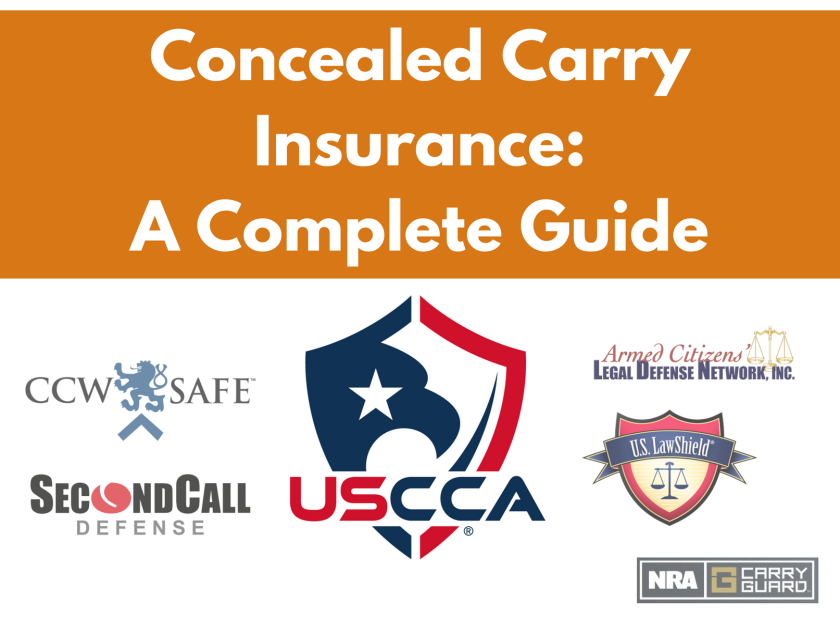Concealed Carry Insurance: A Complete Guide
Concealed Carry Insurance: What It Is, Why You Need It & Who's The Best
Very simply put, concealed carry insurance protects you in the event that you need to defend your life or someone else's life using lethal force. Most concealed carry insurance covers the use of hands or other objects as weapons as well as firearms, so even if you just carry pepper spray, insurance is something you should still consider.
Who do we recommend for self-defense insurance?
The United States Concealed Carry Association, or USCCA, is our choice.
In our opinion, they offer the most comprehensive coverage for those who want to insure & protect themselves legally in the event of a self-defense situation. If you're considering self-defense insurance, you should contact the USCCA.
You should also consult with an attorney experienced in concealed carry and self-defense law to learn about the laws in your state, and how this type of insurance can benefit you. Now let's get to our in-depth guide on self-defense insurance, commonly referred to as concealed carry insurance.
You insure your home, your business, your life, your vehicle, and even your boat or high-priced valuables should you be privy to such items. These policies give you peace of mind in the event that the unthinkable were to occur, and your agent is just a phone call away to begin the claims process. Yes, you hope you never have to use it, but it’s there when and if you do.
While we’ve mentioned some of the more common types of insurance above, one policy that you might not be aware of is concealed carry insurance. The Second Amendment of the United States Constitution gives all Americans the right to keep and bear firearms, and while there’s the hope that firearm owners will never have to use them in a self-defense situation, incidents happen.
After all, there are times when the only thing that can stop a bad guy with a gun is a good guy with a gun. That’s where concealed carry insurance can come in useful, should you have the proper documentation to carry in public settings.
This report will cover concealed carry insurance in detail, from explaining exactly what it is and what it covers to the various providers that offer it.
What Is Concealed Carry Insurance?
As the name implies, concealed carry insurance is ideal for anyone that is licensed to carry a firearm with them. When an individual carries a firearm, there’s always that risk that they’ll one day have to use it in a self defense situation, similar to how there’s always the risk of being involved in a car accident when you get behind the wheel of an automobile. Most self-defense insurance covers more than just firearms, so even if you have to defend yourself in your home with a frying pan, you may still be covered depending on your provider.
For those individuals that do have to discharge the firearms they carry with them, the aftermath can get complicated. This is true even considering that most states have “shoot first” or “stand your ground” laws that permit discharge when an individual believes a situation warrants it.
Specifically, concealed carry policies cover situations such as self-defense, negligent discharge, and the use of deadly force. Generally, spouses and significant others are covered by the same policy, though there may be an additional fee depending on the particular provider. Concealed carry insurance is also commonly referred to as “gun owner’s insurance” or “personal firearm protection insurance.”
Regardless of the circumstances involving the shooting incident, you might be involved in a civil or criminal lawsuit because of your actions – and when you bring lawyers and the court system into play, costs can rapidly escalate.
Just take the 2012 George Zimmerman incident for example. Legal proceedings from his criminal case dragged out for more than a year and put Zimmerman at more than $2.5 million in debt. Even a civil suit resulting from a negligent discharge in a public setting can come with hefty legal fees.
This is one of the biggest benefits of having concealed carry insurance, as policies almost always cover legal fees that result from shooting incidents. Considering that lawsuits can last several years and potentially cost hundreds of thousands to millions of dollars, having a concealed carry insurance policy can potentially save gun owners from bankruptcy or financial ruin.
Though all concealed carry policies generally cover any subsequent legal fees to some extent, other coverage varies based on the provider. For instance, some will cover bail bond funds and lost wages due to court appointments. Others may cover you if you’re involved in a shooting incident across state lines. Some might even cover minor children that live in your household.
It’s important to note that concealed carry insurance is not mandatory, which can make people question whether or not it’s truly necessary. Generally, it’s always advised to mitigate risk, even if that risk is minimal. And certainly someone carrying a firearm is always at risk of having to use it should certain situations arise.
Is Self-Defense Insurance Worth It?
Like we said in the opening, every time you get behind the wheel of a car, there’s the risk – small as it may be – that you may be involved in an accident. The same can be said for carrying a firearm: The chances that you’ll have to use it may be very minimal, but there’s still that chance.
So what factors should you weigh when deciding whether or not concealed carry insurance is right for you? Here’s a look:
- Location: Where you live is one factor that can help you decide whether or not such a policy is right for you. For instance, if you live in a bustling metropolis where you encounter thousands of people per day, the chances of you having to use your firearm are likely far greater than if you lived in the rural countryside. Unfortunately, providers don’t weigh location when it comes to insurance policy costs, so if you live in a town with 200 people, you’ll be paying the same amount for your membership or plan as you would living in a city with 75,000 people.
- Check your current policies: Specifically, check out your homeowner’s insurance policy, as you may already be covered should you have to discharge your firearm within the home. Obviously, this won’t cover you if you have to discharge your firearm in public, but it helps to know just what you’re covered for when it comes to having to use your guns when weighing any type of concealed carry policy.
- Personality: Are you a cautious, better-safe-than-sorry type of person? Then a self-defense policy is likely for you. Regardless of where you live or how many people you interact with each day, when you carry a firearm there’s always the potential that you may have to use it. Concealed carry insurance can give you peace of mind that you’re covered in case you do have to use it.
What to Look for in Concealed Carry Insurance
As is the case with any insurance policy, there are three main factors that you should pay attention to when it comes to concealed carry insurance: premium costs, coverage caps and overall coverage.
Concealed carry insurance happens to be one of the more affordable types of insurance that is offered. In fact, most premiums cost anywhere from $150 to $400 per year. Do the math, and this translates to anywhere from $12.50 to $33 a month or so. Concealed carry premium costs are dictated by a number of factors, and one of the most significant factors at play is what the particular policy actually covers and what those coverage caps are.
As we noted previously, concealed carry insurance often covers court costs and legal fees. It may also cover bail bonds, situations that occur over state lines and attorney retainer fees. The policies that cover more are likely going to cost more on an annual basis to hold. As you’re weighing policies, keep an eye out for any value-added offerings.
Most providers also include training – whether it be on-site or online – as member benefits. Some policies also cover for personal hardships and psychological treatment in the aftermath of a shooting incident. Some cover spouses or significant others at an extra cost, while others include them in the fee. Be sure to consider the total value proposition of each plan, membership or policy prior to making a decision.
Another factor is coverage amounts. Every insurance plan you have likely has some sort of coverage amount. For instance, your auto insurance policy may cover up to $50,000 in damages. Any costs beyond this that you’re held liable for will be have to be paid out of pocket, however, concealed carry insurance works similarly, and coverage amounts tend to vary based on both provider and policy.
For instance, some policies come with as little as $100,000 limits for liability coverage and $50,000 for criminal defense. Under these policies, the insurer will provide coverage for up to $100,000 and $50,000, respectively, with the insured responsible for costs that go beyond these limits.
Coverage amounts can be a difficult factor to weigh when deciding on a policy, as you can never be sure just how long legal proceedings will carry out if a discharge incident results in a civil lawsuit or criminal trial.
One more thing worth noting about concealed carry insurance is that each provider has a different means of covering members. Some require members to purchase plans that come with different coverage limits, similar to how an auto or life insurance policy would work.
Others require people to buy into a network, where either a monthly or annual fee gives them access to the same benefits that other members are privy to. It’s important to fully understand each model, and what each model or plan offers before making a decision on a policy.
Unlike conventional auto, homeowners and renters insurance policies, concealed carry insurance isn’t something that you can get from the conventional big-name companies, so forget about bundling your concealed carry policy to save on total costs. Concealed carry insurance is only offered by select providers, a fact that makes shopping around and understanding what each offers all the more important.
Concealed Carry Insurance Providers
To best understand concealed carry insurance, it’s best to contact the providers that offer it. That’s because this type of insurance is not mandatory, and is therefore more niche than other types of more common and mandated policies like homeowners and auto insurance. With that said, it can be difficult to research and understand policy information online.
Here’s a look at some of the top providers of concealed carry insurance:
USCCA
As we mentioned, the USCCA is our preference in self-defense insurance, for a number of reasons. If you carry a concealed weapon, we'd recommend taking a seriously look at what the USCCA offers, which you can do here. Firearm owners can become a USCCA member by purchasing one of three offered protection plans: Gold, Platinum and Elite.
The Gold plan runs $22 per month ($247 per year) and offers coverage of up to a half-million dollars in civil suit defenses and damages. It offers $100,000 in criminal defense protection, $5,000 for bond and $350 per day in compensation for individuals involved in civic court cases.
The Platinum plan is the middle-tier offering from USCCA, and costs $30 a month, or $347 annually. It offers coverage of $1 million in civil suit defense and damages, $150,000 for criminal defense protection, $25,000 for bond and pays members $500 a day for each day in civic court.
USCCA’s best offering, the Elite plan, provides coverage of up to $2 million in civil suit defense and damages, $250,000 in criminal defense protection, $50,000 for bond and pays members $750 per day for each day in civic court.
Another unique thing about USCCA’s membership plans is that they all come with some level of coverage for personal hardship and psychological support. This coverage starts at $3,000 for each with the Gold plan and $6,000 for each with the Elite plan.
CCW Safe
Unlike many of the other providers on this list, CCW Safe acts as a legal defense service plan and not so much as an insurance policy provider. This means that for an annual fee, CCW Safe will provider members with an attorney and cover expenses associated with the courts, investigators, expert witnesses, dispositions, documents and more.
CCW Safe members are able to select from a variety of different protection plans. For instance, its “Ultimate Plan” runs $499 a year and covers $1 million in bond, $1 million in civil damages, and unlimited caps on criminal and civic legal defenses, among others. Other plans include the Protector Plan and the Defender Plan, which run $149 and $179, respectively.
The former is more intended for retired military and law enforcement members, and includes work loss compensation, attorney fees, crime scene cleanup in the home and investigator fees. The Defender Plan is ideal for those with state-issued concealed carry permits and includes similar coverage to the Protector Plan.
Finally, CCW Safe also offers the Constitutional Carry Plan for those without a concealed carry permit. It runs $299 a year and covers criminal defense costs, civil defense costs, attorney retainer fees and more. CCW Safe also offers other non-permit plans, such as the Home Defense Plan.
Second Call Defense
Second Call Defense calls itself the first insurance-backed membership group that offers support for gun owners that are involved in firearm discharge situations. The group consists of a team of Second Amendment advocates and firearm rights attorneys.
Second Call Defense’s offerings consist of three plans – Entry Level, Full Coverage and Cadillac Protection. The Entry Level plan provides basic coverage for under $10 per month, or $119 per year. It offers a $10,000 limit on criminal defense protection, $1,000 for bond, $2,000 for an attorney retainer and a variety of other resources.
The Full Coverage plan is a step up from the Entry Level one, carrying $500,000 in the categories of civil suit protection, damages protection and criminal defense protection. The plan also compensates members $250 per day while in court, provides $1,000 for crime scene cleanup, and covers bond and attorney retainer fees up to $5,000. It costs $14.95 per month or about $179 per year.
Finally, Second Call Defense also offers its Cadillac Protection plan, which runs less than $35 a month, or about $400 per year. This is the provider’s most comprehensive plan, as it covers civil suit protection up to $1 million, civil suit damages up to $250,000 and criminal defense protection up to $100,000. The plan also provides up to $25,000 for bond, $10,000 for attorney retainer fees, $2,000 for trauma cleanup and pays plan holders $500 per day for each day they’re in court. All three plans also offer spouse add on for an additional monthly fee.
NRA Carry Guard
The National Rifle Association is synonymous with firearms, so it makes sense that the organization would also offer some form of concealed carry insurance. Dubbed “NRA Carry Guard,” it’s described as a comprehensive self-defense membership program for firearm owners.
NRA Carry Guard members are also privy to insurance benefits, provided by Lockton Affinity. These insurance plans consist of Bronze, Silver, Gold and Gold Plus plans.
The Bronze plan runs $13.95 a month and includes $250,000 worth of protection, including $250,000 in civil protection and up to $50,000 in criminal defense protection.
At $21.95 a month, the Silver plan offers $500,000 worth of protection, including $500,000 in civil protection and $100,000 in criminal defense protection. The Gold offers $1 million in protection at $31.95 per month and the Gold Plus, NRA Carry Guard’s best protection plan at $49.95 per month, offers up to $1.5 million in insurance protection.
Each plan also includes full spousal coverage at no additional cost. NRA Carry Guard members, regardless of whether they also have a concealed carry policy with Lockton Affinity, are also able to benefit from a bevy of training courses. These instructional courses are both in-person and online. NRA Carry Guard is not offered to New York residents.
U.S. & Texas LawShield
U.S. & Texas LawShield is a self-defense membership program that runs $10.95 a month for one adult or $21.90 a month for two adults. The membership program is unique from many of the other plans detailed in this report for a few notable reasons.
One, there are no tiers, limits and no attorney fees necessary for any self defense events that are covered by the membership. This differs from most of the other concealed carry insurance plans that have certain coverage limitations or caps. In other words, if you’re ever brought into civil or criminal court as a result of discharging a weapon, you won’t be on the hook for any legal costs, regardless of how expensive they are.
Another differentiator is the optional add-on coverage offered as part of the LawShield program. For instance, members can add minor children to their plans for an additional $2 a month, multi-state protection for less than $3 a month and bail bond and expert witnesses (only available in Texas, Oklahoma and Pennsylvania) for an additional $2.95 a month.
LawShield’s benefits also extend beyond firearms and to any legal weapon. As value-added member benefits, LawShield also offers discounts on classes, firearms, gunsmithing services, shooting range time and more.
Armed Citizens Legal Defense Network
You can join the Armed Citizens Legal Defense Network (LDN) for $135 per year, $295 for three years or $790 for 10 years. Subsequent renewals cost $95 for one year, $255 for three years or $750 for 10 years, and additional household members can be added for $60 a year. The Armed Citizens Legal Defense Network first aims to educate members, and it does so by providing a 235-page book and DVD set to inform members of their rights when it comes to self defense with a firearm.
In the event that a member discharges their firearm, legal support is then provided if necessary. Specifically, members enjoy a $25,000 fee deposit for the attorney, bail up to $25,000 and access to additional grants and financial help from the program’s Legal Defense Fund should legal proceedings from a civil suit or criminal defense case play out in court.
Specifically, the Legal Defense Fund is comprised of 25 percent of all membership dues and 100 percent of any sponsorship funds that the group receives. Hence, if legal fees begin adding up, members can request financial assistance from the Legal Defense Fund that they’re paying into as part of the Armed Citizens Legal Defense Network.
Another neat thing to note about many of these concealed carry plans and memberships is that they offer continued education opportunities for firearm owners. These resources are often provided in member-only articles and videos. Some, such as USCCA, include a magazine subscription to Concealed Carry Magazine as a value-added bonus. Others offer discounts on firearms and other memorabilia.
Conclusion
Only you can decide if concealed carry insurance is right for you, but generally speaking, it’s a good thing to have – if for nothing else but peace of mind. Be sure to carefully analyze and select the appropriate plan or membership that best suits your needs from the providers that offer it. For more information on concealed carry insurance, go here.
Disclaimer: We are not a legal service, and this advice is our own opinion and should not be considered as legal advice. You should seek appropriate counsel for your own situation. Additionally, this post is intended for those living in the United States. If you live outside of the United States, we would strongly encourage you to seek legal counsel in your respective location.












